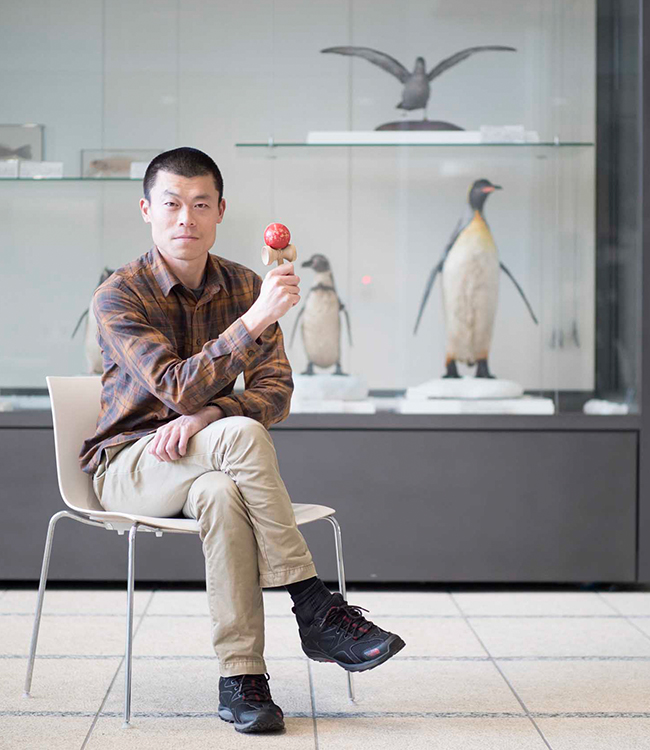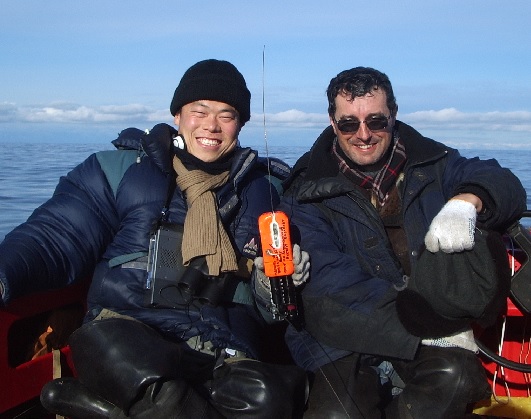Yuuki Watanabe
Associate Professor, National Institute of Polar Research
Class of 2007, Doctoral degree, Graduate School of Agricultural and Life Sciences
(Recipient of a President’s Award in AY 2006)
http://www.geocities.jp/watanabeyuukionline/
Associate Professor, National Institute of Polar Research
Class of 2007, Doctoral degree, Graduate School of Agricultural and Life Sciences
(Recipient of a President’s Award in AY 2006)
http://www.geocities.jp/watanabeyuukionline/

The frigatebird can fly for three days without landing. The Weddell seal can stay underwater for nearly one hour. The Pacific bluefin tuna travels from one side of the Pacific Ocean to the other. The penguin and ocean sunfish employ the same swimming mechanism. Mr. Watanabe, a biologist who travels the world tracking wild animals, has been sharing fascinating insights such as these in his books and other publications. Not himself possessing the ability to fly with frigatebirds or dive with Weddell seals like some kind of superhuman, he instead gathers data using a “superpower” known as bio-logging, which involves attaching small recorders or cameras to wild animals. He then analyzes the logs to create a thoroughly detailed picture of the activities of his subjects.
“I first heard about bio-logging when visiting Professor Yasuhiko Naito of the National Institute of Polar Research, through an introduction from my teacher,” he explains. “His eyes shined with excitement as he told me that he was going to attach a camera to a seal. I remember hearing that and thinking, ‘What’s this all about?’ But at the same time, it sounded interesting.”
On the advice of Professor Nobuyuki Miyazaki from the Ocean Research Institute (presently the Atmosphere and Ocean Research Institute), Mr. Watanabe, while a student at the Graduate School of Agricultural and Life Sciences, went to Russia several times. During his third visit, after a number of setbacks, he finally succeeded in devising a revolutionary technique for collecting a recorder attached to a Baikal seal: program the recorder to detach itself according to a timer so that the recorder would float up to the surface of the ocean to be collected. Compared with the conventional method of catching the animals themselves to retrieve the data, this new method proved far more efficient, and Mr. Watanabe, through his innovation, therefore made a tremendous contribution to the field of bio-logging. “I can now, in my capacity as a teacher, understand the greatness and generosity of Professor Miyazaki, who let me do everything, including the budgeting, even though I was just a graduate student at that time,” says Mr. Watanabe.
“I first heard about bio-logging when visiting Professor Yasuhiko Naito of the National Institute of Polar Research, through an introduction from my teacher,” he explains. “His eyes shined with excitement as he told me that he was going to attach a camera to a seal. I remember hearing that and thinking, ‘What’s this all about?’ But at the same time, it sounded interesting.”
On the advice of Professor Nobuyuki Miyazaki from the Ocean Research Institute (presently the Atmosphere and Ocean Research Institute), Mr. Watanabe, while a student at the Graduate School of Agricultural and Life Sciences, went to Russia several times. During his third visit, after a number of setbacks, he finally succeeded in devising a revolutionary technique for collecting a recorder attached to a Baikal seal: program the recorder to detach itself according to a timer so that the recorder would float up to the surface of the ocean to be collected. Compared with the conventional method of catching the animals themselves to retrieve the data, this new method proved far more efficient, and Mr. Watanabe, through his innovation, therefore made a tremendous contribution to the field of bio-logging. “I can now, in my capacity as a teacher, understand the greatness and generosity of Professor Miyazaki, who let me do everything, including the budgeting, even though I was just a graduate student at that time,” says Mr. Watanabe.

In a TV program titled “Jounetsu Tairiku” (“Passion Continent”), Mr. Watanabe was nicknamed the “Indiana Jones of Biology.” As a young student, however, he leaned more toward mechanics, and he intended to study at the Faculty of Engineering. He had no great interest in biology, as he was under the impression that biologists spent their days staring at microscopic cells.
“But in a class that I just happened to attend as a student of the College of Arts and Sciences, I learned that within biology there was a field in which researchers went outdoors to study the activities of animals,” he explains. “This seemed interesting to me, so I decided to specialize in biology. The College thus guided me into the discipline, even though I did not fully appreciate the worth of studying the liberal arts at that time.”
For the University of Tokyo, which has continued to place value on the liberal arts ever since it was established 140 years ago, Mr. Watanabe is one graduate whose activities we would certainly like to keep track of!
“But in a class that I just happened to attend as a student of the College of Arts and Sciences, I learned that within biology there was a field in which researchers went outdoors to study the activities of animals,” he explains. “This seemed interesting to me, so I decided to specialize in biology. The College thus guided me into the discipline, even though I did not fully appreciate the worth of studying the liberal arts at that time.”
For the University of Tokyo, which has continued to place value on the liberal arts ever since it was established 140 years ago, Mr. Watanabe is one graduate whose activities we would certainly like to keep track of!
Q&A Extras
What do you do to pass the time during snowstorms in the Antarctic?
“Kendama. I have received Level 1 certification from the Antarctic branch of the Kendama Association.”What animals are you currently interested in?
“Sharks belonging to the order Lamniformes. Although they are fish, they have high body temperatures and can swim over long distances.”Besides research activities, what did you devote yourself to during your university days?
“The University of Tokyo Bicycle Racing Team. In fact, I even worked part-time as a bicycle messenger.”Do you have a message you would like to share with current UTokyo students?
“It is more important to think deeply on your own than to communicate with others.”Note: This article was originally printed in Tansei 34 (Japanese language only). All information in this article is as of March 2017.






